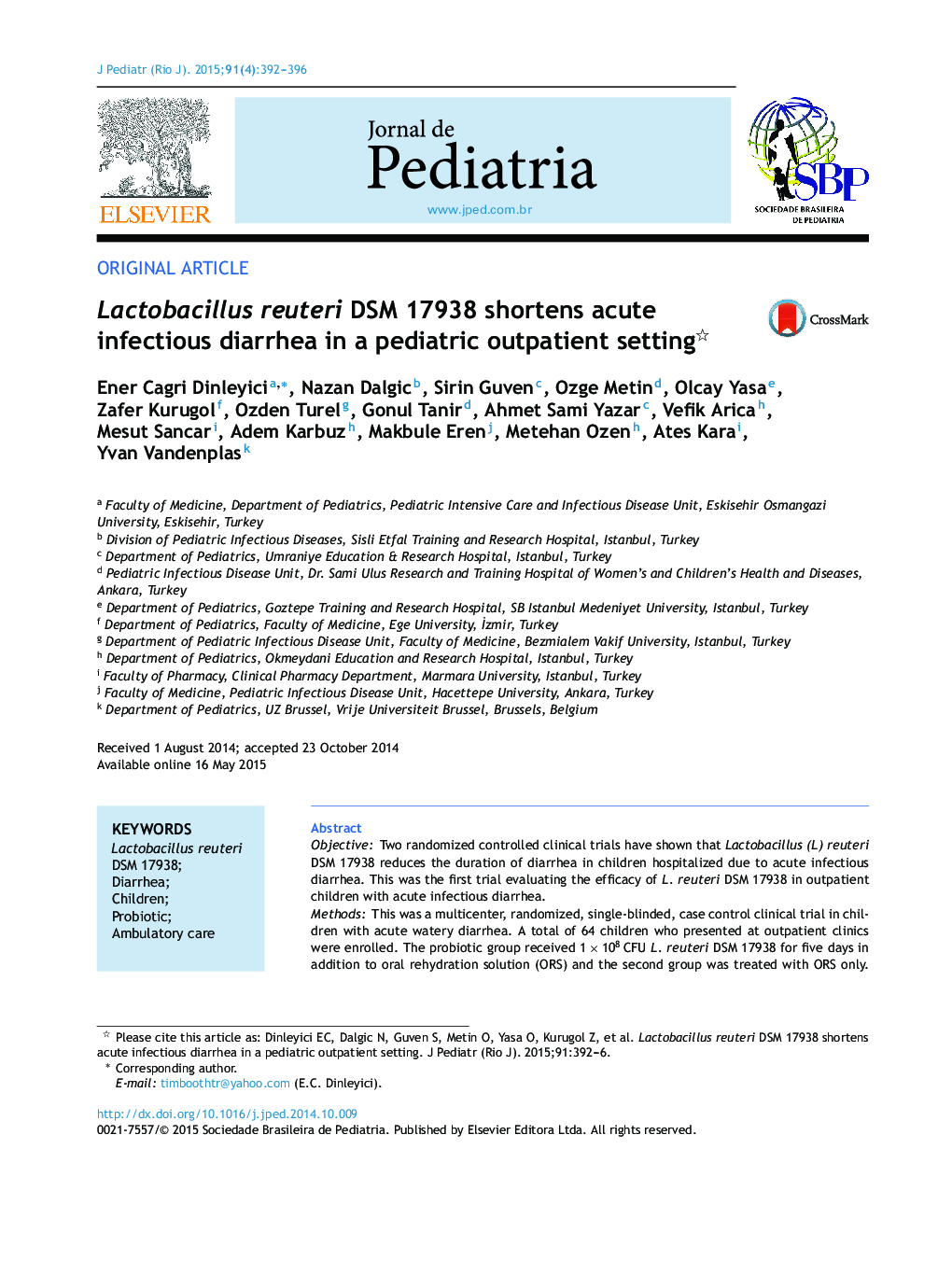| Article ID | Journal | Published Year | Pages | File Type |
|---|---|---|---|---|
| 4153851 | Jornal de Pediatria | 2015 | 5 Pages |
ObjectiveTwo randomized controlled clinical trials have shown that Lactobacillus (L) reuteri DSM 17938 reduces the duration of diarrhea in children hospitalized due to acute infectious diarrhea. This was the first trial evaluating the efficacy of L. reuteri DSM 17938 in outpatient children with acute infectious diarrhea.MethodsThis was a multicenter, randomized, single-blinded, case control clinical trial in children with acute watery diarrhea. A total of 64 children who presented at outpatient clinics were enrolled. The probiotic group received 1 × 108 CFU L. reuteri DSM 17938 for five days in addition to oral rehydration solution (ORS) and the second group was treated with ORS only. The primary endpoint was the duration of diarrhea (in hours). The secondary endpoint was the number of children with diarrhea at each day of the five days of intervention. Adverse events were also recorded.ResultsThe mean duration of diarrhea was significantly reduced in the L. reuteri group compared to the control group (approximately 15 h, 60.4 ± 24.5 h [95% CI: 51.0–69.7 h] vs. 74.3 ± 15.3 h [95% CI: 68.7–79.9 h], p < 0.05). The percentage of children with diarrhea was lower in the L. reuteri group (13/29; 44.8%) after 48 h than the control group (27/31; 87%; RR: 0.51; 95% CI: 0.34–0.79, p < 0.01). From the 72nd hour of intervention onwards, there was no difference between the two groups in the percentage of children with diarrhea. No adverse effects related to L. reuteri were noted.ConclusionL. reuteri DSM 17938 is effective, safe, and well-tolerated in outpatient children with acute infectious diarrhea.
ResumoObjetivoDois ensaios clínicos randomizados controlados demonstraram que o Lactobacillus (L) reuteri DSM 17938 reduz a duração de diarreia em crianças hospitalizadas devido a diarreia infecciosa aguda. Este é o primeiro ensaio que avalia a eficácia do L. reuteri DSM 17938 em crianças com diarreia infecciosa aguda no ambulatório.MétodosEste foi um ensaio clínico multicêntrico, randomizado, único cego, com grupos paralelos e controlado em crianças com diarreia aguda. Um total de 64 crianças internadas na clínica ambulatorial foram inscritas. O grupo probiótico recebeu 1 × 108 CFU L. reuteri DSM 17938 por cinco dias, além de uma solução de reidratação oral (SRO), e o segundo grupo foi tratado apenas com SRO. O desfecho principal foi a duração da diarreia (em horas). O desfecho secundário foi o número de crianças com diarreia em cada um dos cinco dias da intervenção. Os eventos adversos também foram registrados.ResultadosA duração média da diarreia foi significativamente reduzida no grupo L. reuteri em comparação ao grupo de controle (aproximadamente 15 horas; 60,4 ± 24,5 horas [51, 0–69, 7 horas, IC de 95%] em comparação a 74,3 ± 15,3 horas [68, 7–79, 9 horas, IC de 95%], p < 0,05). O percentual de crianças com diarreia foi menor no grupo L. reuteri (13/29; 44,8%) após 48 horas que no grupo de controle (27/31; 87%) (RR: 0,51; 0, 34–0, 79; IC de 95%, <0,01). A partir da 72ª hora de intervenção, não havia nenhuma diferença entre os dois grupos no percentual de crianças com diarreia. Nenhum efeito adverso com relação ao L. reuteri foi observado.ConclusãoO L. reuteri DSM 17938 é eficaz, seguro e bem tolerado por crianças com diarreia infecciosa aguda no ambulatório.
